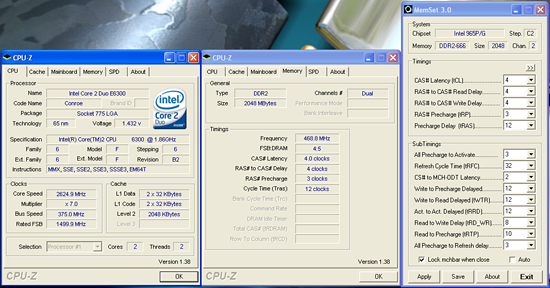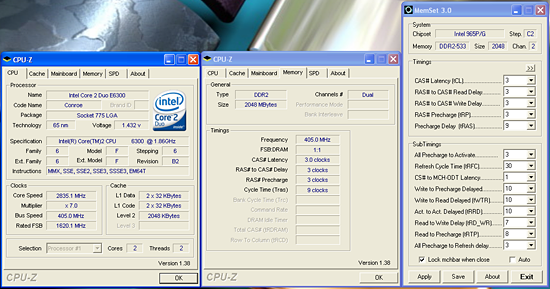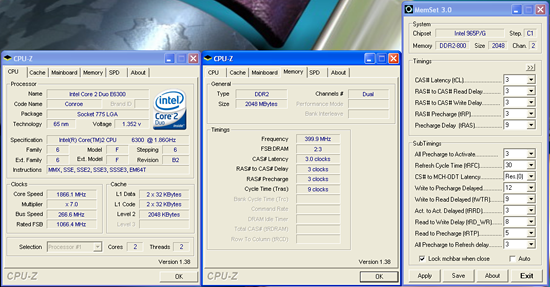Intel P965: MSI P965 Platinum and ECS PX1 Extreme
by Gary Key on December 6, 2006 4:30 AM EST- Posted in
- Motherboards
FSB Overclocking Results

It was very difficult to reach a final benchmark stable setting of 7x405 FSB resulting in a clock speed of 2835MHz with our E6300. The board was actually capable of running at 7x415 FSB but would pass our benchmarks. We set our VCore to a very acceptable 1.400V with Vdroop being around .02~.03V during load testing. We only found that very high-end memory would let us get past the 400FSB mark and in the end settled on 7x375FSB as providing the best overall system performance with our memory set to a 4:5 ratio resulting in a memory speed of 936MHz.
The reason we chose to go with the lower FSB was that memory speed suffers greatly on the P965 chipset as you switch from the 1066 to 1333 strap at 400FSB. It normally takes an increase of around 25~35FSB to make up the difference after a strap change. In fact, at the 375FSB setting the 1066 memory strap and internal P965 MCH timings are being overclocked and this setting was the limit for our components. While SuperPi scores will suffer due to this benchmark being CPU centric, we found our gaming scores were anywhere from 1%~4% better across the range. Our application benchmarks were a toss up as encoding is usually more CPU bound than bandwidth limited.
Memory Stress Testing
We take a look now at seeing how well our GEIL PC2-6400 memory operates in this board in both two and four DIMM testing. The screenshot above shows the actual memory settings used in our benchmark tests of the board. We do not modify the memory timings beyond the four major settings in our charts. The remaining memory settings are implemented automatically via the BIOS. MSI uses fairly tight memory and MCH timings resulting in minor performance differences in our standard benchmark testing.
We were able to set our timings to 3-3-3-9 by increasing the memory voltage to 2.20V with our GEIL memory. We were able to hold these timings up to DDR2-860 on this board along with timings of 3-4-4-9 up to DDR2-880. The board ran at 4-4-3-10 up to DDR2-910 before switching to the final overlclock settings of 4-4-3-12.
Our settings of 4-4-3-10 at 2.20V were not quite as good as our more performance oriented boards that allow settings of 3-4-3-10 but due to tighter overall memory latencies the benchmarks were still competitive. We were able to keep this setting up to DDR2-840 before switching over to 4-4-4-12 settings that held stable until we reached DDR2-880. We then kept a setting of 5-4-4-12 at 2.20V up to our final overclock setting of 7x375, 2625MHz/DDR2-936, with four DIMMs installed.
| MSI P965 Platinum Overclocking Testbed |
|
| Processor: | Intel Core 2 Duo E6300 Dual Core, 1.86GHz, 2MB Unified Cache 1066FSB, 7x Multiplier |
| CPU Voltage: | 1.4000V (default 1.3250V) |
| Cooling: | Scythe Infinity Air Cooling |
| Power Supply: | OCZ GameXStream 700W |
| Memory: | Geil PC2-6400 800MHz Plus (2x1GB - GX22GB6400PDC) (Micron Memory Chips) |
| Video Cards: | 1 x MSI X1950XTX |
| Hard Drive: | Seagate 320GB 7200RPM SATA2 16MB Buffer |
| Case: | Cooler Master CM Stacker 830 |
| Maximum CPU OC: | 405x7 (3-3-3-9, 1:1, 2.25V), CPU 1.400V, 2835MHz (+52%) |
| Optimum OC: | 375x7 (4-4-3-12, 4:5, 2.30V), CPU 1.400V, 2625MHz (+41%) |
| . | |
 |
| Click to enlarge |

It was very difficult to reach a final benchmark stable setting of 7x405 FSB resulting in a clock speed of 2835MHz with our E6300. The board was actually capable of running at 7x415 FSB but would pass our benchmarks. We set our VCore to a very acceptable 1.400V with Vdroop being around .02~.03V during load testing. We only found that very high-end memory would let us get past the 400FSB mark and in the end settled on 7x375FSB as providing the best overall system performance with our memory set to a 4:5 ratio resulting in a memory speed of 936MHz.
The reason we chose to go with the lower FSB was that memory speed suffers greatly on the P965 chipset as you switch from the 1066 to 1333 strap at 400FSB. It normally takes an increase of around 25~35FSB to make up the difference after a strap change. In fact, at the 375FSB setting the 1066 memory strap and internal P965 MCH timings are being overclocked and this setting was the limit for our components. While SuperPi scores will suffer due to this benchmark being CPU centric, we found our gaming scores were anywhere from 1%~4% better across the range. Our application benchmarks were a toss up as encoding is usually more CPU bound than bandwidth limited.
Memory Stress Testing
 |
| Click to enlarge |
We take a look now at seeing how well our GEIL PC2-6400 memory operates in this board in both two and four DIMM testing. The screenshot above shows the actual memory settings used in our benchmark tests of the board. We do not modify the memory timings beyond the four major settings in our charts. The remaining memory settings are implemented automatically via the BIOS. MSI uses fairly tight memory and MCH timings resulting in minor performance differences in our standard benchmark testing.
| MSI P965 Platinum Stable DDR2-800 Timings - 2 DIMMs (2/4 slots populated - 1 Dual-Channel Bank) |
|
| Clock Speed: | 800MHz |
| CAS Latency: | 3 |
| RAS to CAS Delay: | 3 |
| RAS Precharge: | 3 |
| RAS Cycle Time: | 9 |
| Voltage: | 2.20V |
We were able to set our timings to 3-3-3-9 by increasing the memory voltage to 2.20V with our GEIL memory. We were able to hold these timings up to DDR2-860 on this board along with timings of 3-4-4-9 up to DDR2-880. The board ran at 4-4-3-10 up to DDR2-910 before switching to the final overlclock settings of 4-4-3-12.
| MSI P965 Platinum Stable DDR2-800 Timings - 4 DIMMs (4/4 slots populated - 2 Dual-Channel Bank) |
|
| Clock Speed: | 800MHz |
| CAS Latency: | 4 |
| RAS to CAS Delay: | 4 |
| RAS Precharge: | 3 |
| RAS Cycle Time: | 10 |
| Voltage: | 2.20V |
Our settings of 4-4-3-10 at 2.20V were not quite as good as our more performance oriented boards that allow settings of 3-4-3-10 but due to tighter overall memory latencies the benchmarks were still competitive. We were able to keep this setting up to DDR2-840 before switching over to 4-4-4-12 settings that held stable until we reached DDR2-880. We then kept a setting of 5-4-4-12 at 2.20V up to our final overclock setting of 7x375, 2625MHz/DDR2-936, with four DIMMs installed.










13 Comments
View All Comments
mostlyprudent - Wednesday, December 6, 2006 - link
I had been looking forward to the review of the MSI board. I can understand some OC limitation at the price, but then don't call it a "Platinum" board. I really don't do very much OCing, but always view the ability to reach high overclocks as a sign of a more well engineered board.Anyway, thanks for the review.
Beachspree - Monday, December 11, 2006 - link
I was wondering why the Firewire performance is so poor in these reviews:Firewire 400 gets a best throughput of 230.6Mb/s
It is known that Macs have poor USB 2 performance but look at the Firewire results by Barefeats:
http://www.barefeats.com/usb2.html">http://www.barefeats.com/usb2.html
http://www.barefeats.com/hard70.html">http://www.barefeats.com/hard70.html
Without the perfect conditions of a RAM disk and no cacheing they get real world performance of up to:
Firewire 400: 304 Mb/s (31% faster)
Firewire 800: 464 Mb/s (41% faster)
For comparison, Macs are getting lousy USB 2 performance. Intel Macs have improved it but that takes it from around 136Mb/s to 168Mb/s. That's 75% slower.
Given the importance of Firewire in critical multimedia applications and it's likely use for HD video camcorders does this poor performance not warrant a mention?
Beachspree - Monday, December 11, 2006 - link
To be clearer:Can we please have some real world figures for USB 2.0, eSATA and Firewire 400/800 transfers?
That should take the form of transfers of:
a) Many small files
b) One large file
under default settings and off an internal 7200 HDD you standardize on. That's what most people actually do when the backup, so that's what we need to see in order to make informed choices. I suspect these data rates you keep publishing are ones we will actually never see.
I suggest, also, that poor Firewire performance in Windows is more important than poor USB on Macs. They always have Firewire built in and tend to it on peripherals, while Windows users often make do with USB until they get into music or video editing when they then find the need for Firewire and hit this poor performance just when they start needing mission critical performance. I'm talking about dropped frames and music latency.
Why is that ignored in all your motherboard reviews?
Thanks.